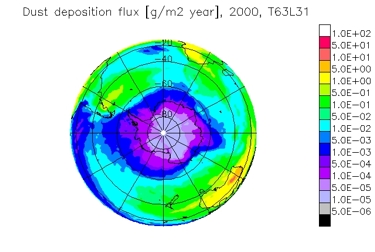|
Mineral dust variability in the Southern Ocean
Principal Investigators: Johann Feichter (MPI Hamburg), Uwe Mikolajewicz (MPI Hamburg), Anna Wegner (AWI Bremerhaven), Hubertus Fischer (University of Bern)
Project Scientists: Natalia Sudarchikova (MPI Hamburg)
Mineral dust can be transported over long distances from desert regions to the polar ice sheets.
Polar ice cores represent the only direct archive for the deposition of aeolian dust particles in the past. While the total dust deposition is a first order measure of dust mobilization, and hence climate conditions in the dust source regions, particle size distributions allow for a quantification of transport efficiency. In Antarctica dust is of particular interest as an indicator of climate conditions and it may also have played an active role in the long-term climate chandes through radiative feedbacks.
Here we will combine latest Antarctic dust records from the EPICA ice core from Dronning Maud Land and a coupled state-of-the art Global Climate model (ECHAM5) with an explicit aerosol scheme (HAM) to quantify paleoclimatic changes in dust mobilization, transport and deposition. High-resolution ice core dust analysis on atmospheric dust concentration and particle size distribution are performed for selected time slices in the Holocene, MIS 5.5 and during the transition into the warm periods in parallel to time slice model runs. Appropriate boundary conditions for the high-resolution atmosphere only simulations will be taken from long simulations with an earth system model. In return the effect of dust on past climate changes will be assessed. The time scales addressed by both model and ice core data range from seasonal changes, interannual variability to long-term changes in dust mobilization and transport, constraining potential dust source regions and their temporal changes as well as spatiotemporal variability in Circumantarctic circulation patterns.
Aeolian dust size and concentration measurements, climate models
Archives
Ice cores
|
| < Prev | Next > |
|---|


